A Historian Against the Current: The Life and Work of Austin Gough
Longo, who was a student of Gough’s in the 1970s, must have read widely in his attempts to understand Gough’s thinking, and his biography has a clear chronological development from Gough’s birth in 1926.
READ REVIEW
↓
A Historian Against the Current:
The Life and Work of Austin Gough
Don Longo | 2021
It appears from Don Longo’s well-investigated biography, A Historian Against the Current: The Life and Work of Austin Gough, that his subject was never reconciled to the ‘May Days’ of 1968. Whatever the degree of their true radicalism, the soixante-huitards appear to have cemented Gough’s conservative resistance to such socially reformative actors throughout his life. It is doubtful that he looked as a historian at the ‘revolution’ of young adults who believed everything seemed possible in the resurgence from post-war austerity. The middle-aged Gough disallowed their creative vision. He only once offered an alternative to a public scheme, the principles of which he approved: in place of the Keating government’s Creative Nation and Australia Council grants (of 1994), he publicly proposed ‘a market based system’ and tax concessions, which won much support (p. 181).
Gough’s one-time University of Adelaide colleague, Hugh Stretton, once described him as a ‘highly intelligent, conservative journalist’ (p. 3). Longo, who was a student of Gough’s in the 1970s, must have read widely in his attempts to understand Gough’s thinking, and his biography has a clear chronological development from Gough’s birth in 1926. Yet, it is important that he explain to readers something more of his subject’s early intellectual biases: what the Syllabus of Errors is and what weight the Manicheans had in the scheme, the meaning of Montanism and (if it needed to be written), where the Ticinese live. Gough ‘was one-eight [sic]’ Ticinese, but this information is obscurely relevant. Gough’s one major historical publication, Paris and Rome: The Gallican Church and the Ultramontane Campaign, 1848-1853 (1986) concerns those phenomena.
Why in mid-adolescence Gough slipped into agnosticism then disbelief is not explained (p. 19). But convincing reasons are given for his choice to pursue a career as a historian of ‘France and the relations between church and state’ (p. 51-54).
After his schooling at Xavier College in Warrnambool, Victoria in the early 1940s, Gough worked at an Imperial Chemical Industries dyestuff plant, then enlisted in the Royal Australian Air Force, fitfully took tertiary studies, and from 1947 to 1952 was an editor-journalist in rural New South Wales. As a public servant with the Postmaster-General’s department, Gough studied part-time. In 1959, having married, he entered full-time university study and in 1961 applied successfully for an Oxford scholarship.
One finds no satisfactory answer as to why Gough devoted so much archival research and attempted writings to areas from which he personally recoiled: only one of his publications is ‘not concerned with Catholicism’ (p. 120). Gough claimed to be an atheist, yet no internal argument of his is exposed; he was a lapsed Catholic, but we have no analysis of his doctrinal dispute. Is it paradoxical to be an atheist, yet firmly conservative in social-political attitudes? A method Longo often uses is a literary affectation and self-contradiction. He summarises characteristics by alternative threes: the nineteenth century bishops, priests and journalist of most of Gough’s histories ‘are at once individuals and types, singular and general, historically unique and ideologically archetypical’ (p. 138).
Longo’s portrait gives a fine idea of the attitudes of an (almost) unremitting political and social conservative. But the context of this conservatism is under-studied: a note (not discussion) of the Cold War’s affect on Gough is quickly passed over. The Vietnam War (especially given Gough’s university student connections), or any assessment of Whitlam’s China foray, are lacking. This is especially troubling, as these events provided conditions for the counter-cultural student unrest and demands for ‘democratic’ university governance and ‘relevance’ in study subjects that Gough found untenable and downright wrong. The period of student ‘revolt’ at the University of Adelaide is described by Longo.
In 1991 Gough retired from the University of Adelaide (he had moved there from Monash University in 1970 to take up a professorship of history). He moved to Tasmania, then returned to Victoria and died there in 1997. The weight of Longo’s life-story is evenly distributed, but Gough remains a quandary to this reader. The book has a short, unhelpful index but a good bibliography of Gough’s publications of mainly reviews and journalism.
Reviewer: Bridget Jolly, PHA (SA)
A Historian Against the Current is published by Wakefield Press.

